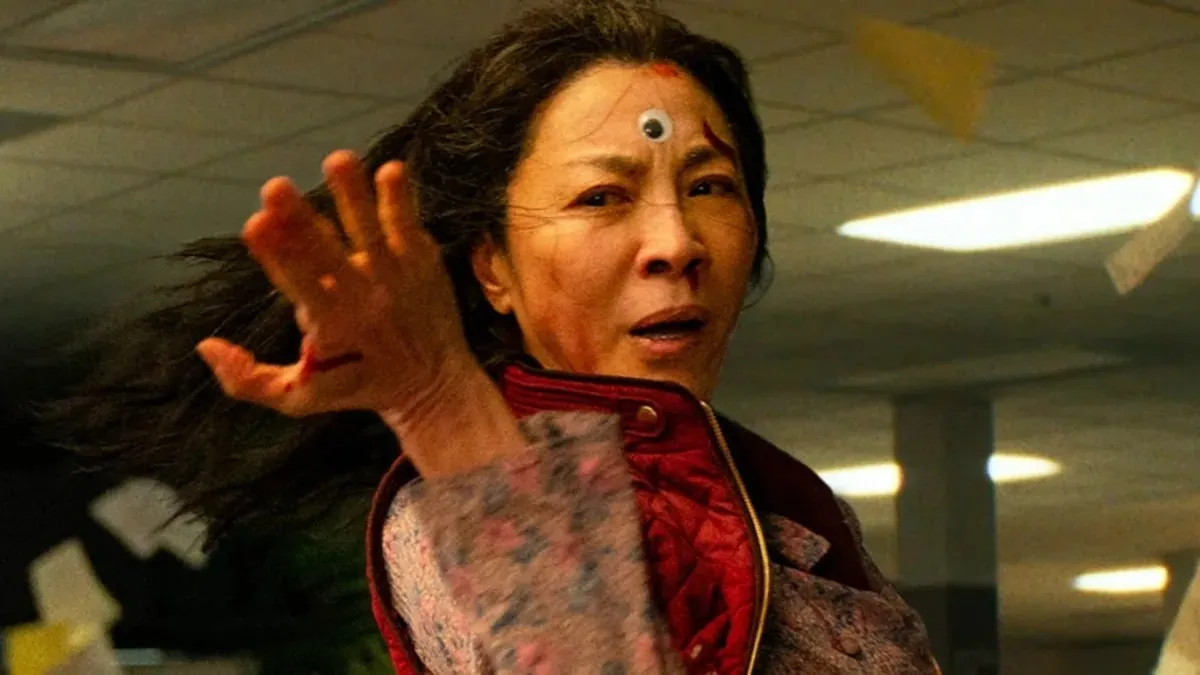Evelyn Wang, a Chinese-American immigrant played by Michelle Yeoh, is introduced as someone weighed down by life’s many responsibilities. Between struggling to keep her laundromat business afloat, and trying to understand her gentle but naïve husband Waymond (Ke Huy Quan).
She is also dealing with her daughter Joy’s issues (Stephanie Hsu), and caring for her elderly, traditional father Gong Gong (James Hong), she’s constantly overwhelmed. But her life takes an unexpected twist during a regular visit to the IRS when a multiversal crisis suddenly engulfs her.

She finds herself thrown into a chaotic world filled with alternate versions of herself and must now accept the strange truth that she alone holds the power to save existence. This new task requires her to draw strength and skill from all the other versions of herself across various realities.
However, her bigger worry lies in the discovery that one version of her daughter, known as Jobu Tupaki, now threatens all universes with her destructive power. Even with the overwhelming visuals, odd characters, and the endless realities that can confuse anyone, the film still carries a very heartfelt message.
At the center of all the madness, Evelyn’s journey remains focused on fixing her strained relationship with her daughter.
Her movement from one universe to another isn’t just about stopping a universal collapse — she’s also looking for a way to make Joy understand that life still has value, even with all the confusion and pain. With every leap into a different version of life, Evelyn slowly tries to mend what’s broken between them.
Jobu Tupaki and the Everything Bagel
You can’t discuss how Everything Everywhere All At Once wraps up without mentioning one of the strangest but most important things in the story — the everything bagel. The film’s final major confrontation takes place inside an IRS building, where Evelyn and others from the Alphaverse go head-to-head with Jobu Tupaki.
This version of Joy gained her reality-bending powers due to experiments done by the Alphaverse version of Evelyn. During this face-off, we are told the origin of the Everything bagel. “I got bored one day, then I put everything in a bagel… everything.
All my hopes and dreams, my old report cards, every breed of dog, every personal ad on Craigslist… sesame… poppy seed… salt, and it collapsed in on itself. ‘Cause you see when you put everything on a bagel, it becomes this… the truth.”
This bagel looks harmless enough — round, with toppings, just like something from a breakfast menu. But in the film, it turns into something that functions like a black hole, swallowing whatever it touches. Instead of breakfast, it delivers a painful realization about life’s emptiness.
Although Tupaki keeps this bagel inside an all-white, sacred-like space, you start to realize that circles and rings have been part of the story from the very beginning. Her circular hair accessory during the temple scene looks exactly like the bagel itself.
Even during Evelyn’s tax audit, the IRS inspector Deirdre repeatedly draws black circles on her paperwork, subtly marking Evelyn with the bagel’s symbol. The door of the washing machine — constantly spinning — also serves as a reflection of Evelyn’s routine, joyless life.
Evelyn even gives a speech where she mentions how people just keep going around in circles. The repeating circular pattern and the Everything bagel both come to represent hopelessness, confusion, and dissatisfaction with life. Instead of giving meaning, the bagel sucks everything in, creating an emotional emptiness.
Jobu Tupaki turns this emptiness into her identity. For her, life has no point, no meaning, and that’s exactly what the bagel symbolizes. It tells her to abandon her dreams and let go of all-purpose. The Everything bagel becomes her tool to end all universes, dragging them into the same meaningless state she believes in.
After experiencing the multiverse, Tupaki starts believing that no matter what choices people make, nothing will ever truly make sense. She uses the bagel to express this emptiness and looks for someone who can understand what she feels.
She’s been looking for Evelyn — not to fight her, but to convince her to join in destroying all of existence. She doesn’t want to go through the void alone.
Waymond Wang and the Power of Love and Kindness
At the point when Evelyn seems ready to give in to Tupaki’s dark beliefs, her husband Waymond steps in and shows her another way to look at things. Waymond doesn’t ignore the chaos or deny how confusing life can be. Instead, he chooses to focus on hope and positivity.
In one of the alternate universes where Evelyn becomes a martial arts celebrity, Waymond tells her, “You tell me it’s a cruel world and we’re all running around in circles. I know that. I’ve been on this earth just as many days as you.”
He understands why someone like Jobu Tupaki would give up, but he sees another way. He says, “When I choose to see the good side of things, I’m not being naive. It is strategic and necessary. It’s how I’ve learned to survive through everything.” That’s how he gets through his pain — by choosing kindness.
This eventually helps Evelyn realize that Tupaki’s idea is not the only truth out there. The Waymond from Evelyn’s actual universe also delivers his moving speech that pushes her to fight for what still has value. “I know you are all fighting because you are scared and confused.
I’m confused too,” he says, “All day, I don’t know what the heck is going on. But somehow this feels like it’s all my fault.” With his marriage under strain, the laundromat business about to collapse, and his dreams hanging by a thread, Waymond is someone who could have given up.
The American Dream that brought him and Evelyn to the United States now seems broken. But instead of surrendering, he chooses compassion and says, “I don’t know. The only thing I do know is that we have to be kind. Please. Be kind, especially when we don’t know what’s going on.”
This belief in kindness is what Evelyn carries with her into the final battle. She doesn’t rely on violence to stop her enemies. Instead, she uses her multiverse abilities to give each person some piece of joy or relief.
From making dreams come true to expressing love in the weirdest of realities — like when she shares a romance with IRS agent Deirdre in a universe where they both have hotdog fingers — Evelyn applies her powers with compassion. These actions stand as the opposite of Jobu Tupaki’s view of meaninglessness.
Nothing Matters, Except…
When Evelyn eventually reaches her daughter, now Jobu Tupaki, she doesn’t go alone. With support from Waymond and even her own father Gong Gong, they all make a combined effort to bring her back from the edge of destruction.

Despite the painful history between Gong Gong and Evelyn, and then between Evelyn and Joy, there’s a common desire to fix what’s broken and stay together. Evelyn comes close to giving up but changes her mind, showing her daughter that love is enough reason to hold on.
Repeating some of Tupaki’s earlier words, Evelyn says, “Maybe it’s like you said. Maybe there is something out there, some discovery that will make us feel like even smaller pieces of shit. Something that explains why you still went looking for me through all of this noise.”
But even when science and technology make humans feel small, Evelyn says she still chooses her daughter. “No matter what, I still want to be here with you. I will always, always, want to be here with you.”
When Joy responds that life only offers a few tiny moments of clarity, Evelyn answers, “Then I will cherish these few specks of time.” With that, they hug, and Joy finally steps away from the nothingness the everything bagel promised.
A Cultural Breakthrough That Goes Beyond Words
What happens between Evelyn and Joy in those final moments isn’t some shallow sentimental reunion. It is a serious and emotional breakthrough. For two people raised in a traditional structure where emotions are often hidden, expressing vulnerability is a very big deal.
In many Asian families, elders are seen as being beyond correction. Children are meant to obey without complaint, and parents are not expected to apologize — because they are never supposed to be wrong. This strict setup forms the background tension throughout the film.
Evelyn and Joy’s conflict isn’t always loud, but it sits there in the silence and the passive reactions. Joy tries to meet expectations that leave her drained, while Evelyn responds in ways that reflect her pressure to uphold authority. But both of them are hurting.
What changes things isn’t a grand moment but the simple courage to acknowledge that pain — and decide not to walk away from each other. You can also watch it on Prime Video.



